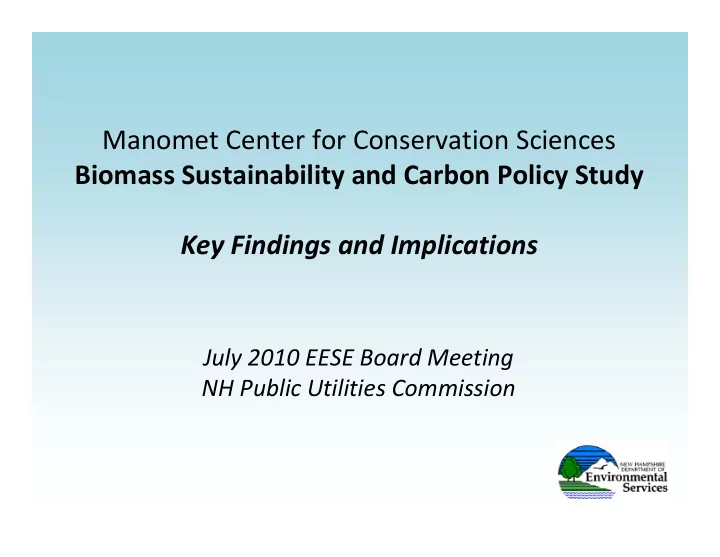

Manomet Center for Conservation Sciences Biomass Sustainability and Carbon Policy Study Biomass Sustainability and Carbon Policy Study Key Findings and Implications Key Findings and Implications July 2010 EESE Board Meeting NH P bli Utiliti NH Public Utilities Commission C i i
MA Biomass Energy Timeline l • 2009 MA stays all new biomass energy projects • Nov 2009 MA commissions a biomass study Selects Manomet Center for Consr Sci s Selects Manomet Center for Consr Sci’s • Nov 2009 MA public sessions • June 2010 Study released Media circulates narrow interpretation Participating organizations issue Participating organizations issue corrections
Manomet Study Framework k 1. Study is specific to the state of Massachusetts y p 2. Supply Analysis • Assessed the economically available wood supply d h i ll il bl d l 3. 3 Carbon Accounting a bo ccou g • Stand ‐ level • 13 biomass energy pathways – 5 fossil fuel pathways • • Reports the “carbon deficit” and “carbon dividend” Reports the carbon deficit and carbon dividend
Manomet Study Findings d
Manomet Study Findings d
Manomet Study NH Stakeholder Review k h ld 1. The number one priority is keeping forests as forests. 2. The issue of terrestrial carbon cycling is complex, and studies use assumptions and have limitations which need to be considered before any conclusions are made be considered before any conclusions are made. 3. Biomass has the potential to be a sustainable alternative to fossil fuels that has the ability to recapture carbon over time with proper management. 4. To maximize the “rate of return” need policies that affect the selection of biomass fuel sources; forest management the selection of biomass fuel sources; forest management techniques; fossil fuel replaced; and application. 5. These policies will have economic and ecological implications.
MA Biomass Energy Policy Landscape l d MA Biomass Referendum ‐ HOUSE No. 4458 “provided that use of combustion or pyrolization to generate alternative energy does not result in the emission of more than two hundred and fifty pounds of carbon dioxide per megawatt hour.” MA Biomass Legislation (alternative bill to referendum) “renewable energy generating source must be designed, constructed and operated as a combined heat and power facility having a total overall fuel operated as a combined heat and power facility having a total overall fuel conversion efficiency from feedstock to final combustible fuel of not less than 70 percent” Letter TO DOER– July 7 2010 Letter TO DOER– July 7, 2010 Alignment of MA RPS Class 1 Regulations Proposed Draft regulations – September 1 P Proposed FINAL regulations – October 31 d FINAL l ti O t b 31 Final regulations in place – December 31
Next Steps Biomass Availability Study • DOER will accept and post written public comments on the Manomet Study through July 9, 2010. E ‐ mail those comments d h h l l h (as MS Word or PDF files) to doer.biomass@state.ma.us. • In September, the Manomet Center has plans to hold a roundtable discussion regarding the analysis • The Environmental Business Council will host Study team leaders and experts for presentations and discussion on Tuesday, July 13, 2010 from 7:30 AM ‐ 10:00 AM in Waltham, MA MA – More info available here
Next Steps MA RPS Class 1 Regulations • DOER will hold a set of public meetings in July to review the p g y Manomet Study and discuss policy implications and options. • These discussions will be followed by a deliberate and open policymaking process in July and August to review proposed regulatory and policy directions of DOER and gain stakeholder g y p y g input on potential changes to the Renewable Energy Portfolio Standard (RPS) and other policy options. • Following this public review, DOER will engage in formal rulemaking to revise the RPS regulations in the fall. rulemaking to revise the RPS regulations in the fall.
NH Response Multi ‐ Path Approach l h h • State agencies coordinating communications regarding MA study conclusions and policy implications d l d l l • Members of the non ‐ profit community are drafting their own p y g response – contact Will Abbott ‐ wabbott@forestsociety.org • CSNE convening a Forest Carbon Analysis Working Group – contact Cameron Wake ‐ cameron.wake@unh.edu or 603 ‐ 862 ‐ 2329 862 2329 • The private sector was identified as being in the best position/most appropriate to engage with the State of MA position/most appropriate to engage with the State of MA during the process considering biomass energy.
Recommend
More recommend